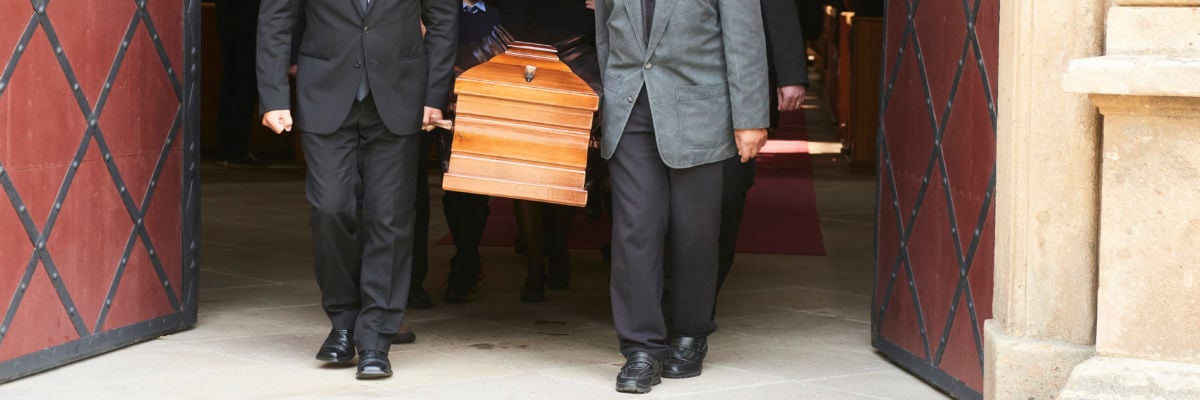
Previously, we discussed how the Eucharist is a sacrifice that makes present, here (in this church in New York City) and now (August 16, 2023) Jesus’ offering of himself on Calvary—his act of absolute, perfect obedience to the Father that brings salvation to all humanity. Let’s follow that with another question: why do we celebrate Masses for the dead?
Catholics are known sometimes to give bereaved people “Mass cards”—cards that say Mass will be celebrated at a certain place and time (or announce an enrolment in a spiritual confraternity for whose members Masses are regularly celebrated) for a deceased person. This is something uniquely Catholic; one of the core tenets of the Protestant Reformation was to reject the efficacy of prayer for the dead.
As Catholics, we believe that a person’s permanent spiritual identity is established at death. A person makes himself into a certain kind of person morally—good or bad—throughout his lifetime, which is to say when his body and soul were joined together. Death—the separation of body and soul—means that a person’s time for changing his moral identity is over. What he has become, he is . . . forever. That is why we Catholics speak of death, followed by judgment, ending in heaven or hell.
Or purgatory.
Purgatory is another Catholic teaching the Protestant Reformation rejected. It is, however, a reality that corresponds to human life and experience.
Mortal sin—sin that destroys the life of God in our souls because it is so radically opposed to supernatural charity, love—is truly deserving of the word sin. But we also know there are many sins that people commit that do not completely break their relationship with God, because the matter itself is not grave, they did not truly commit themselves to it, and/or their freedom was in some way impaired (perhaps, for example, by addictions). The things they did were wrong. God is perfect; therefore, nothing that is tainted by sin even slightly can be in his presence. Purgatory is a way for persons who die in the state of grace (i.e., not stained by mortal sin) but also still not yet perfect in charity to become perfect.
Purgatory purifies the soul of those venial sins that impede the soul’s perfect ascent to God. But, as we noted above, death ends a person’s ability to change morally, because body and soul—the integral person—are broken apart. The soul is, therefore, passive vis-à-vis himself. He can do nothing for himself (though, from love, he can do for others, which is why we can invoke the prayers of the faithful departed). As long as supernatural charity is present, we can always help others.
As Catholics, we affirm the “communion of saints”—i.e., that those in this world, in purgatory, and in heaven remain connected by bonds of charity (see Catechism of the Catholic Church, 958). That is why, even already in the Old Testament, the biblical writer could tell us, “It is a holy and wholesome thought to pray for the dead” (2 Macc. 12:46).
We, who are alive, can do acts of charity for our faithful departed in purgatory they cannot do for themselves. Our charity can be extended to them to help atone for their sins.
Now, if we are looking for prayer to atone for sins, there can be no more perfect, no more absolute, no more complete prayer than Christ’s sacrifice, which is made present in the sacrifice of the Mass. When the priest offers Mass for a particular intention, be it for someone living or dead, Jesus’ perfect prayer of obedience is offered to God specifically out of our love for that particular person. We can offer our own prayers, individual acts of self-denial, or almsgiving on their behalf, but there is no more efficacious prayer, no more efficacious act than Jesus’ own sacrifice (CCC 1032, 1055). After all, we can’t save ourselves, but God enables the “widow’s mite” of our good deeds done in grace and charity to contribute. But Jesus’ sacrifice (which makes our charity possible) is a qualitatively and wholly other reality.
That is why Catholics bid their loved one’s farewell with a funeral Mass soon after death (CCC 1689) and why they regularly arrange for Mass to be celebrated for their loved ones, especially on the anniversary of their death. We believe that, through Christ, we remain joined to those who have “gone before us, marked with the sign of faith,” and that there is no better way for us to reach the home of our Father than through the re-presentation of Jesus’ sacrifice in the Mass.
Let me offer a modern observation. Oftentimes, especially in non-Catholic funerals or movies and television shows that include funerals, the emphasis is on the deceased’s life: what he did, what he achieved, what a great person, spouse, parent, etc. he was. Oftentimes, there is a eulogy that concentrates on those high points.
That approach seems to get it backwards. It seems really not to believe in life after death, or else it presumptuously assumes that “all dogs [and people] go to heaven.” As Catholics, we are hopefully more realistic: people often die with some moral warts (something that, pressed hard enough, the eulogizing might admit). So, instead of focusing on what was, what can’t be changed anyway, Catholics want to focus on what is: a brother who needs our prayers as he stands before a merciful but also just God. St. Ambrose summed it up: “We have loved them during life; let us not abandon them in death, until we have conducted them by our prayers into the house of the Lord.”
And there is no more efficacious way to do that than through the Holy Sacrifice of the Mass.



